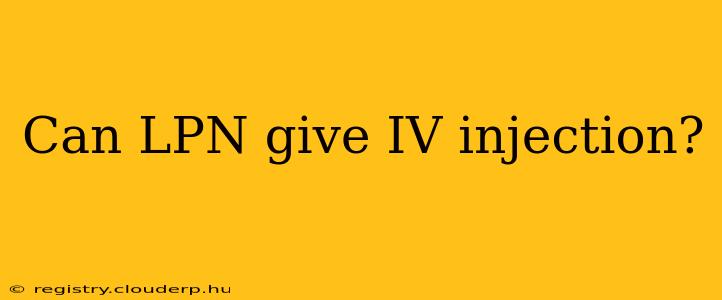Can LPNs Give IV Injections? The Complexities of Scope of Practice
The question of whether Licensed Practical Nurses (LPNs) can administer IV injections is not a simple yes or no answer. It depends heavily on several factors, primarily the state's scope of practice laws, the employer's policies, and the specific training and certifications held by the individual LPN.
While some states allow LPNs to administer IV medications under specific circumstances and with appropriate supervision, others strictly prohibit it. The practice is generally more common in settings where there is physician oversight and a well-defined protocol. Even when legally permitted, the specific types of IV medications an LPN can administer might be limited.
Here's a breakdown of the key factors:
State Laws and Scope of Practice:
This is the most crucial determinant. Each state's board of nursing defines the permissible activities for LPNs. These regulations are often detailed and nuanced. Some states may allow IV therapy only with extensive additional training and certification, while others may restrict it entirely to Registered Nurses (RNs). It is essential to consult the relevant state's board of nursing website for the most up-to-date and accurate information.
Employer Policies:
Even if state law permits LPNs to give IV injections, the individual healthcare facility or employer might have internal policies that restrict this practice. These policies often reflect the specific needs and risk tolerance of the organization. A hospital with a high patient volume and complex medical needs might reserve IV administration for RNs, while a smaller clinic might allow LPNs to perform this task under specific conditions.
Training and Certification:
Many states require LPNs to complete specialized training programs in intravenous therapy before they are permitted to administer IV medications. This training typically includes both theoretical knowledge and hands-on practice. Additional certifications, such as those offered by professional organizations, can further enhance an LPN's qualifications. However, holding a certification does not automatically guarantee the right to administer IVs; state law remains the ultimate authority.
What about specific IV procedures?
The types of IV procedures an LPN can legally perform are often even more restricted than whether they can administer IVs at all. Certain medications, administration methods (e.g., push versus infusion), or patient populations might necessitate the skills and judgment of a registered nurse.
Why the variation in practice?
The differences in scope of practice reflect a balance between providing safe patient care and maximizing the efficient use of healthcare professionals. IV therapy involves potential risks, requiring a thorough understanding of medication administration, fluid balance, and potential complications. RNs generally receive more extensive training in these areas compared to LPNs.
Is it safe for LPNs to give IV injections?
The safety of LPNs administering IV injections depends entirely on the context. When an LPN is properly trained, operates within their state's scope of practice, and adheres to strict protocols, it can be a safe practice. However, without appropriate training, oversight, or adherence to regulations, it can pose significant risks to patients.
In conclusion, whether an LPN can give an IV injection is a nuanced question determined by state law, employer policy, and individual training. Always refer to the relevant state board of nursing regulations for definitive answers and never assume an LPN is qualified to administer IV medication without verifying their credentials and scope of practice.

